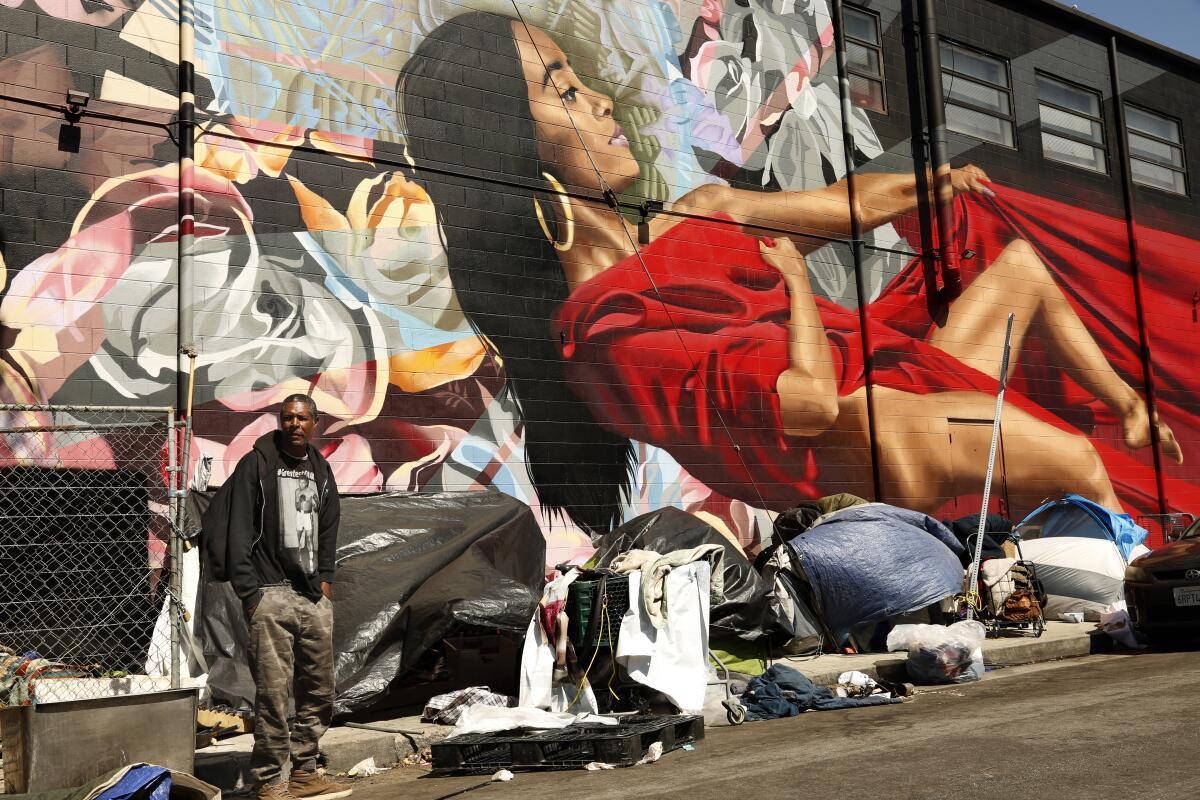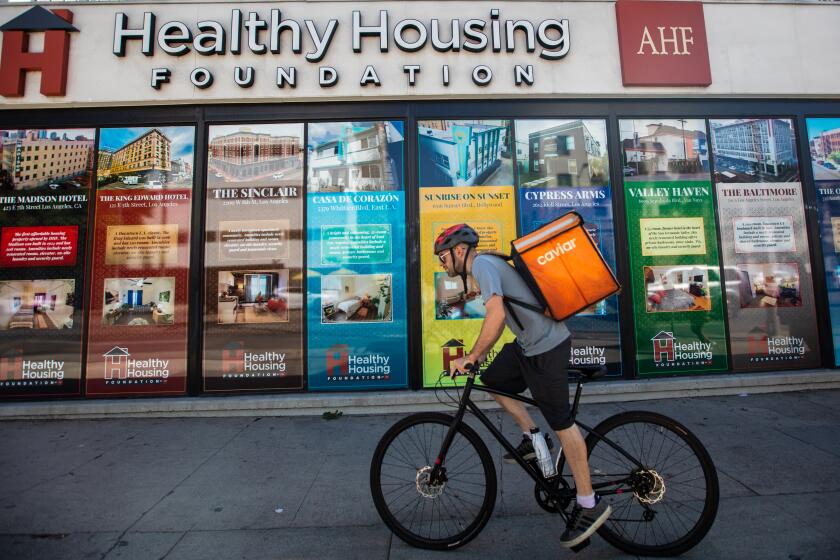Civic groups launch campaign to double L.A. County’s quarter-cent homelessness sales tax

- Share via
An alliance of civic groups is gathering signatures to place a measure on the November ballot that would double L.A. County’s homelessness sales tax to a half-cent to raise more funds for housing,prevention and services.
If approved by a majority of voters, it would replace Measure H, the quarter-cent sales tax voters approved in 2017, two years ahead of its 10-year sunset date to make a smooth transition.
Proponents estimate it would produce $1.2 billion annually.
The money would fund homelessness programs, including mental health care, substance abuse treatment, affordable housing, rental subsidies, job counseling and services for vulnerable populations including homeless families, veterans, abused women, seniors and disabled persons.
The measure, dubbed Affordable Housing, Homelessness Solutions and Prevention Now, would require programs to set and meet specific targets and mandate regular audits to ensure those showing the highest rates of effectiveness receive sufficient funds.
“We see it as central to bringing accountability and ensuring that we have some kind of system in place to deal with the affordable housing and homeless crises for the long term,” said Miguel Santana, chief executive of the California Community Foundation and one of the measure’s five named backers.
Proponents have formed a campaign committee, Experts United to End Homelessness, and have been gathering signatures since December. They expect to file their petitions with the recorder ahead of the May deadline to qualify for the November ballot, said campaign manager Derek Mazzeo.
Lining up to support the measure are many of the same philanthropic and labor leaders and homeless services providers who were key to the success of campaigns for Measure H and the city’s 2016 Proposition HHH bond measure to fund housing construction.
The Hollywood-based AIDS Healthcare Foundation is in line to acquire homeless housing developments owned by a failed Skid Row landlord. State housing officials are objecting to the deal, citing the foundation’s troubled track record.
For the record:
12:16 p.m. April 2, 2024An earlier version of this article misidentified Veronica Lewis as founder and board member of Homeless Outreach Program Integrated Care System. She is the organization’s director.
Besides Santana of the California Community Foundation, the measure will list as supporters Elise Buik, president and chief executive of the United Way of Greater Los Angeles, and three officials with homeless services and housing nonprofits: Veronica Lewis, director of Homeless Outreach Program Integrated Care System (HOPICS); Andrew Kerr, co-founder of Housing Works; and Edgar Campos, executive director of TRUST South L.A.
Service Employees International Union Local 721 is also backing the campaign.
Santana, the former Los Angeles city administrative officer, drafted the city’s groundbreaking 2016 homeless strategy and later chaired the oversight committee for the city’s $1.2-billion Proposition HHH homeless housing bond. He said the new measure was crafted to take advantage of past experience.
“For someone like me who has been working on these issues for my whole career, it reflects the lessons learned from Measure H and HHH.”
When adopted in 2017, the Measure H quarter-cent sales tax was projected to produce about $355 million annually. That amount had grown to $527 million by the 2022-23 fiscal year.
The measure, which passed with just more than the two-thirds majority required, included a 10-year sunset clause to allow voters the chance to decide whether it should be extended.
Election law has since been changed allowing for a simple majority to pass tax measures introduced by citizens, as opposed to governing bodies.
Backers said their decision to double the revenue and make the tax indefinite — subject to repeal only by a future public vote — reflects that there is no foreseeable end to a homelessness crisis that has only grown worse in recent years.
“The reality is that this is a systems change on how to provide mental health and other supportive services to get people into housing, and there isn’t a sunset on that,” said Sarah Dusseault, one of the measure’s drafters.
The Angeleno Project, a nonprofit that supports the measure, released polling Tuesday that shows likely support from 60% of likely voters, with 39% of respondents saying they would definitely support it, 15% that they support it but could change their mind, and 6% saying they leaned yes.
What the poll, conducted by David Binder Research, “reflects is that Angelenos haven’t given up yet and that Angelenos believe that more needs to be done,” said Santana, who also co-chairs the Angeleno Project.
The Angeleno Project was formed by the Committee for Greater L.A., a coalition of civic leaders who are grappling with proposals for “sweeping systems change” to improve the lives of vulnerable and marginalized communities in Los Angeles.
Breakdowns of the survey results showed even higher support for specific elements of the measure: increasing mental health treatment for those experiencing homelessness (82%), preserving existing affordable housing (78%), reducing the cost of building affordable housing and housing for the homeless (77%), reducing the burden on local emergency rooms (74%), creating pathways out of poverty through construction (74%) and building more affordable housing (72%).
Increasing temporary housing like motel rooms and tiny homes fell at the low end with 50% support.
At this early stage, there is no formal opposition to the tax proposal, but anti-tax groups likely to come out against the measure may take a soft-sell approach, relying on voter dissatisfaction with past government efforts, said Lance Christensen, vice president of education policy and government affairs at the conservative-leaning California Policy Center.
“The voters are wondering how much more tax dollars are going to go to failure,” Christensen said.
Noting the narrow winning margin for the recent statewide homeless bond measure Proposition 1 with little spent in opposition, Christensen suggested donors might think, “If they can pony up a few dollars more than they did with Prop. 1, they will be successful in voting this down.”
Backers of the measure said they designed it to make the strategy for using the funds more outcome-oriented and build in more explicit accountability than in Measure H.
“What makes this different from the past is that this is citizen driven,” Santana said. “This really is informed by our best thinking based on all of our experience, the lessons learned.”
The 20-page ballot measure specifies that 60% of the revenue would be directed to homelessness services and 15% of that would be distributed to cities based on the annual point-in-time count.
Another 35.75% would go to the L.A. County Affordable Housing Solutions Agency, a new entity created last year by the California Legislature to help people stay in their homes and increase housing and shelter for people experiencing homelessness. The money could be used for rental assistance, purchase or lease of existing housing and new construction.
The new county housing agency is organized on the Metro model with a 22-member board consisting of all five members of the county Board of Supervisors, L.A. Mayor Karen Bass and two Los Angeles City Council members, mayors and council members from seven other cities, and representatives from philanthropic, legal and housing organizations.
More to Read
Sign up for Essential California
The most important California stories and recommendations in your inbox every morning.
You may occasionally receive promotional content from the Los Angeles Times.











